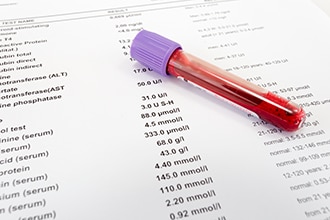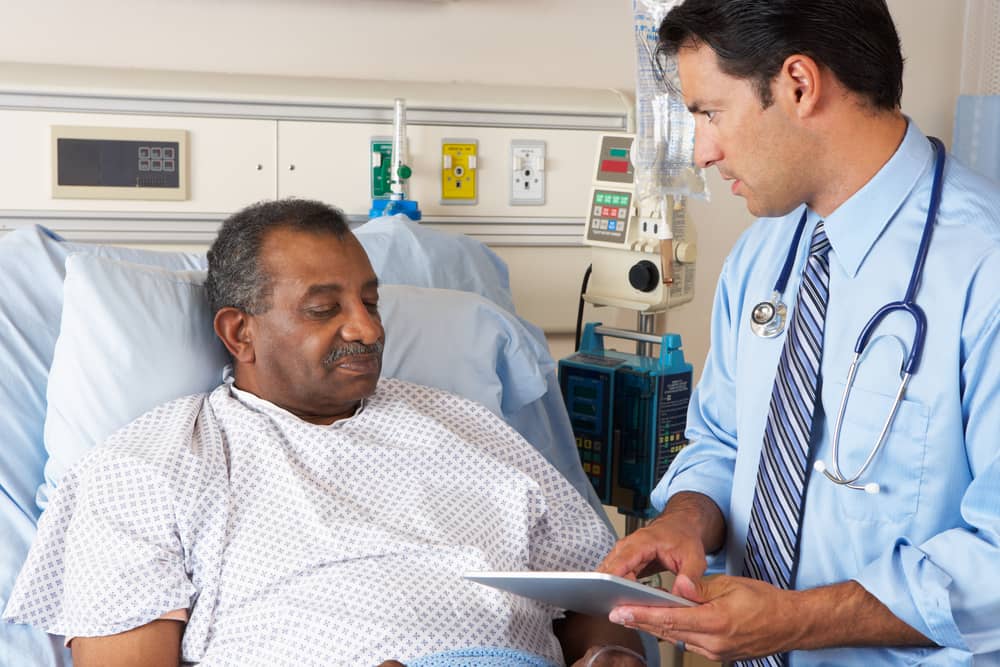Primary Sclerosing Cholangitis
Return to Overview PageDefinition & Facts
In this section:
- What is PSC?
- How common is PSC?
- Who is more likely to develop PSC?
- What other health problems do people with PSC have?
- What are the complications of PSC?
What is PSC?
Primary sclerosing cholangitis (PSC) is a chronic liver disease in which the bile ducts inside and outside the liver become inflamed and scarred, and are eventually narrowed or blocked. When the bile ducts are narrowed or blocked, bile builds up in the liver and causes further liver damage. This damage can lead to cirrhosis and, eventually, liver failure. Medical experts believe PSC is an autoimmune disease, in which the immune system attacks normal, healthy bile duct cells.
How common is PSC?
Researchers estimate about 5 to 16 people out of every 100,000 have PSC.1
Who is more likely to develop PSC?
PSC is more commonly diagnosed in people who1,2
- are between the ages of 30 and 40, although PSC may occur at any age.
- are male. PSC affects twice as many males as females.
- have inflammatory bowel disease (IBD), most commonly ulcerative colitis.
 PSC affects twice as many males as females.
PSC affects twice as many males as females.
What other health problems do people with PSC have?
People with PSC may have other health problems, including
- IBD
- gallstones
- autoimmune hepatitis
- other autoimmune diseases, such as type 1 diabetes, celiac disease, and thyroid diseases
About 7 out of 10 people who have PSC also have IBD.1
What are the complications of PSC?
PSC can lead to liver complications such as cirrhosis, cancers, and bile duct infection.
Liver complications
PSC can damage the liver, leading to cirrhosis and its complications.
Cirrhosis
In cirrhosis, scar tissue replaces healthy liver tissue and prevents your liver from working normally. As cirrhosis gets worse, the liver begins to fail.
Portal hypertension
Portal hypertension most often occurs when scar tissue in the liver slows the normal flow of blood, which causes high blood pressure in the portal vein. The portal vein is the large blood vessel that carries blood from your stomach, intestines, spleen, gallbladder, and pancreas to the liver.
When portal hypertension reaches a certain level, it can cause additional complications, such as
- swelling in the legs, ankles, or feet, called edema
- buildup of fluid in the abdomen, called ascites
- enlarged veins—called varices—in the esophagus, stomach, or intestines, which can lead to gastrointestinal bleeding if the veins burst
- confusion or difficulty thinking caused by a buildup of toxins in the brain, called hepatic encephalopathy
Liver failure
Cirrhosis may eventually lead to liver failure, also called end-stage liver disease. With liver failure, your liver is badly damaged and stops working. People with liver failure may require a liver transplant.
Cancer
PSC can increase the chance of developing certain cancers.
- Bile duct cancer is the most common type of cancer in people who have PSC. People with PSC have a 10% to 20% chance of developing bile duct cancer at some point in their lives.3
- People with PSC have an increased chance of getting gallbladder cancer.
- People with cirrhosis due to PSC have an increased chance of getting liver cancer.
- People with PSC and IBD have an increased chance of getting colorectal cancer.
Bile duct infection
People with PSC may develop a bacterial infection in narrowed or blocked bile ducts. Medical procedures that affect the bile ducts, such as endoscopic retrograde cholangiopancreatography, increase the chance of bile duct infection.
Other complications
Other complications of PSC may include
- low levels of fat-soluble vitamins A, D, E, and K
- osteoporosis, or loss of calcium from the bones
References
Symptoms & Causes
What are the symptoms of PSC?
 Symptoms of PSC include itchy skin.
Symptoms of PSC include itchy skin.
Symptoms of primary sclerosing cholangitis (PSC) may include
- pain in the abdomen, or belly
- itchy skin
- diarrhea
- yellowish color of the whites of the eyes and skin, called jaundice
- feeling tired or weak
- fever
PSC may lead to a bile duct infection. Symptoms of a bile duct infection include
- chills
- fever
- new or worsening jaundice
- pain in the upper right side of the abdomen
As the disease gets worse, you may develop cirrhosis. Symptoms of cirrhosis may include
- swelling of the abdomen from a buildup of fluid, called ascites
- confusion or difficulty thinking caused by a buildup of toxins in the brain, called hepatic encephalopathy
- gastrointestinal bleeding caused when enlarged veins—called varices—burst in the esophagus, stomach, or intestines
- other symptoms of cirrhosis, such as edema, jaundice, and weight loss
Because PSC gets worse slowly, you can have the disease for years before you have any symptoms. Many people have no symptoms when they are first diagnosed with PSC.
What causes PSC?
Experts aren’t sure what causes PSC. Studies suggest that several factors may play a role, including
- genes
- immune system problems
- changes in the bacteria in the digestive tract, also called gut flora or the gut microbiome
- bile duct injury caused by bile acids
Diagnosis
How do doctors diagnose PSC?
Doctors diagnose primary sclerosing cholangitis (PSC) based on medical and family history, a physical exam, and the results of medical tests.
Medical and family history
The doctor will ask about your symptoms. He or she may also ask whether you have
- a history of inflammatory bowel disease (IBD), particularly ulcerative colitis
- a parent or sibling who has PSC or IBD
- a personal or family history of autoimmune diseases, such as autoimmune hepatitis, type 1 diabetes, celiac disease, and thyroid diseases
Physical exam
Your doctor will examine your body, including your abdomen. He or she will check for
- signs of cirrhosis and liver failure, such as jaundice, which can make the whites of the eyes and skin look yellow
- scratch marks from scratching itchy skin
- signs that the liver and spleen are larger than they should be
- tenderness or pain in the abdomen
What tests do doctors use to diagnose PSC?
Blood tests
 Liver tests can show abnormal liver enzyme levels in your blood.
Liver tests can show abnormal liver enzyme levels in your blood.
A health care professional will take a blood sample from you and send the sample to a lab.
Liver tests can show abnormal levels of liver enzymes and other substances in your blood. Abnormal levels of certain liver enzymes may be a sign your liver or bile ducts are damaged.
Imaging tests
To diagnose PSC, doctors typically order a special imaging test to examine the bile ducts, such as
- magnetic resonance cholangiopancreatography (MRCP), which uses a magnetic resonance imaging (MRI) machine to create pictures of the bile ducts. MRCP is the most common test that doctors use to diagnose PSC.
- endoscopic retrograde cholangiopancreatography (ERCP), which combines upper gastrointestinal (GI) endoscopy and x-rays to examine the bile and pancreatic ducts. Doctors may also use ERCP to treat narrowed bile ducts.
- percutaneous transhepatic cholangiography (PTC), which is an x-ray of the bile ducts. A health care professional inserts a needle through the skin and into the liver to inject a special dye into the bile ducts. The special dye lets a doctor see the bile ducts on the x-ray.
Doctors may also order other imaging tests to check for signs of PSC, other bile duct or liver problems, or complications. These tests include
- ultrasound, which uses a hand-held device, called a transducer, that bounces safe, painless sound waves off organs to create an image of their structure.
- computed tomography (CT) scans, which uses a combination of x-rays and computer technology to create images of the liver.
- elastography, a special test that measures the stiffness of the liver. Increased liver stiffness may be a sign of fibrosis, or scarring.
Liver biopsy
A liver biopsy is generally not needed to diagnose PSC. However, in some cases, doctors may order a liver biopsy to check for signs of other liver diseases, such as autoimmune hepatitis.
During a liver biopsy, a doctor will take small pieces of tissue from the liver. A pathologist will examine the tissue under a microscope.
Colonoscopy
For people who have PSC and haven’t already been diagnosed with IBD, doctors may recommend a colonoscopy to check for IBD. Many people with PSC have mild IBD and don’t have IBD symptoms.
Treatment
In this section:
- How do doctors treat PSC?
- How do doctors treat the complications of PSC?
- When do doctors consider a liver transplant for PSC?
- What can I do to prevent further liver damage?
How do doctors treat PSC?
Currently, no cure or effective treatments for primary sclerosing cholangitis (PSC) exist. However, doctors can treat narrowed or blocked bile ducts and symptoms of PSC.
Narrowed or blocked bile ducts
If bile ducts are narrowed or blocked, doctors may use endoscopic retrograde cholangiopancreatography (ERCP) to open them and help keep them open. To help keep ducts open, doctors sometimes place stents. Stents are tiny tubes that a doctor leaves in narrowed ducts for a short time to hold them open.
In some cases, doctors may use percutaneous transhepatic cholangiography to open narrowed or blocked bile ducts.
Itchy skin
Doctors may recommend over-the-counter medicines or prescribe medicines to treat itchy skin caused by PSC.
How do doctors treat the complications of PSC?
Liver complications
Doctors may recommend treatments for liver complications of PSC.
Cirrhosis or portal hypertension
If PSC leads to cirrhosis or portal hypertension, doctors can treat the health problems related to these conditions with medicines, medical procedures, or surgery.
Liver failure
If cirrhosis leads to liver failure, you may need a liver transplant.
Cancer
PSC increases the risk for developing several types of cancer. Your doctor may recommend tests to check for signs of cancer. Finding cancer at an early stage improves the chance of curing the cancer.
- For adults with PSC, doctors may suggest imaging tests and blood tests to check for bile duct cancer and gallbladder cancer.
- For people with cirrhosis caused by PSC, doctors may suggest blood tests and an ultrasound or another type of imaging test to check for liver cancer.
- For people with PSC and inflammatory bowel disease, doctors may suggest a colonoscopy to check for colorectal cancer.
Bile duct infection
To treat a bile duct infection, doctors may prescribe antibiotics. To help prevent bile duct infections, doctors may prescribe antibiotics for people with PSC before and after they have procedures, such as ERCP, that increase the risk of getting an infection.
Other complications
Doctors may treat other complications of PSC with medicines, dietary supplements, or changes in diet or lifestyle.
- For low levels of vitamins A, D, E, and K, doctors may recommend taking dietary supplements of these fat-soluble vitamins. Follow your doctor’s instructions on the type and amount of vitamins you should take.
- For osteoporosis, doctors may prescribe medicines that slow or stop bone loss and improve bone density. Doctors may recommend taking dietary supplements of calcium and vitamin D.
When do doctors consider a liver transplant for PSC?
Doctors may consider a liver transplant if PSC leads to liver failure or causes severe symptoms or complications. In some patients with bile duct cancer, liver transplant may be the best treatment. Doctors consider liver transplants only after all other treatment options have failed. Talk with your doctor to find out whether a liver transplant is right for you.
 Doctors may consider a liver transplant if PSC leads to liver failure.
Doctors may consider a liver transplant if PSC leads to liver failure.
What can I do to prevent further liver damage?
If you have PSC, you can take steps to help prevent further liver damage.
- Follow your doctor’s instructions carefully and take medicines and dietary supplements as directed.
- Quit smoking.
- Do not use illegal drugs.
- Stop drinking alcohol or, at least, limit your intake. If you have PSC and cirrhosis, completely stop drinking alcohol.
- Have regular checkups, as recommended by your doctor.
- Talk with your doctor before taking
- over-the-counter medicines.
- dietary supplements.
- complementary and alternative medicines.
- Try to reach and stay at a healthy body weight.
Eating, Diet, & Nutrition
What should I eat if I have PSC?
People with primary sclerosing cholangitis (PSC) should eat a healthy, well-balanced diet. Good nutrition is important in all stages of PSC—including cirrhosis—to help the liver work properly and manage complications.
Your doctor can recommend a healthy diet that provides enough calories and nutrients. Your doctor may recommend taking dietary supplements of calcium and vitamin D to help prevent osteoporosis. For low levels of fat-soluble vitamins A, D, E, or K, your doctor may recommend taking supplements of these vitamins. Follow your doctor’s instructions on the type and amount of vitamins you should take.
 Good nutrition is important in all stages of PSC.
Good nutrition is important in all stages of PSC.
What should I avoid eating if I have PSC?
You should avoid eating raw or undercooked shellfish, fish, meat, and unpasteurized milk. Bacteria or viruses from these foods may cause severe infections in people with liver disease.
Doctors may recommend that people with PSC stop drinking alcohol or, at least, limit their intake. People who have PSC and cirrhosis should completely stop drinking alcohol.
Clinical Trials
The NIDDK conducts and supports clinical trials in many diseases and conditions, including liver diseases. The trials look to find new ways to prevent, detect, or treat disease and improve quality of life.
What are clinical trials for PSC?
Clinical trials—and other types of clinical studies—are part of medical research and involve people like you. When you volunteer to take part in a clinical study, you help doctors and researchers learn more about disease and improve health care for people in the future.
Researchers are conducting clinical studies to better understand liver diseases, such as primary sclerosing cholangitis (PSC). For example, researchers are studying
- the causes of PSC and how it develops
- medicines to treat PSC
- whether diet may affect PSC
Find out if clinical studies are right for you.
Watch a video of NIDDK Director Dr. Griffin P. Rodgers explaining the importance of participating in clinical trials.
What clinical studies for PSC are looking for participants?
You can view a filtered list of clinical studies on PSC that are federally funded, open, and recruiting at ClinicalTrials.gov. You can expand or narrow the list to include clinical studies from industry, universities, and individuals; however, the NIH does not review these studies and cannot ensure they are safe. Always talk with your health care provider before you participate in a clinical study.
This content is provided as a service of the National Institute of Diabetes and Digestive and Kidney Diseases
(NIDDK), part of the National Institutes of Health. NIDDK translates and disseminates research findings to increase knowledge and understanding about health and disease among patients, health professionals, and the public. Content produced by NIDDK is carefully reviewed by NIDDK scientists and other experts.
The NIDDK would like to thank:
Christopher L. Bowlus, M.D., University of California Davis School of Medicine

